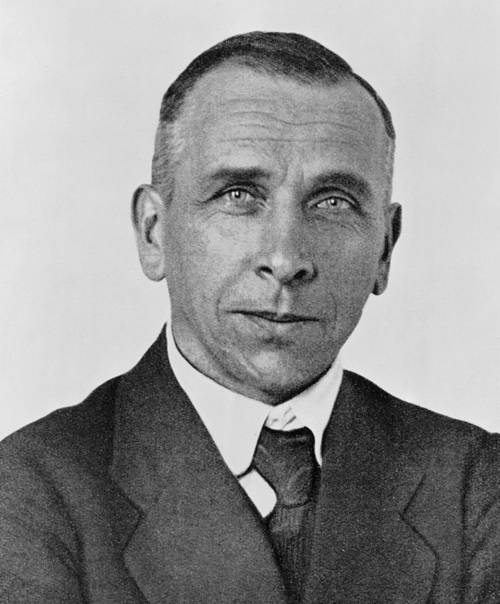
FAQ About Alfred Wegener

Who was Alfred Wegener?
Alfred Wegener was a German climatologist and geophysicist born on November 1, 1880. He is best known for developing the theory of continental drift, which proposed that continents move across the Earth's surface over geological time. His work laid the foundation for the modern theory of plate tectonics.

What is Alfred Wegener famous for?
Alfred Wegener is most famous for his theory of continental drift, first proposed in 1912. This theory suggested that continents were once part of a single landmass and have drifted apart over millions of years. Although initially controversial, his ideas eventually led to the broader acceptance of plate tectonics, transforming our understanding of Earth's geology.

What was the continental drift theory proposed by Alfred Wegener?
Alfred Wegener's continental drift theory posited that the continents were once joined together in a supercontinent called Pangaea, which broke apart and drifted to their present positions over geological time. Wegener gathered evidence from various scientific fields, including geology, fossil records, and climatology, to support his ideas.

Why was Alfred Wegener's continental drift theory initially rejected?
Initially, Wegener's continental drift theory was rejected by many in the scientific community because it lacked a plausible mechanism for how continents could move. Critics argued that he could not adequately explain the forces driving the movement of continents. It wasn't until the development of plate tectonics in the mid-20th century that a mechanism for continental drift was accepted.

How did Alfred Wegener come up with the idea of continental drift?
Alfred Wegener came up with the idea of continental drift by observing the jigsaw-like fit of the continents, particularly how the coastlines of South America and Africa appeared to match. He also collected data from paleontology, geology, and climatology, which suggested similarities and past connections among now-distant continents.

What evidence did Alfred Wegener use to support his theory?
Wegener used several lines of evidence to support his continental drift theory, including the fit of continental margins, matching geological formations, fossil correlations across continents, and paleoclimate indicators such as glacial deposits in now-tropical regions.

What was the scientific reaction to Wegener's proposal of continental drift?
The scientific community's reaction to Wegener's continental drift theory was largely skeptical at first. While some scientists found his evidence intriguing, many rejected his ideas due to the lack of a mechanism for movement and the strong adherence to the then-prevailing theory of a static Earth.

Did Alfred Wegener live to see his theory accepted?
No, Alfred Wegener did not live to see his theory of continental drift widely accepted. He died on November 1930 during an expedition in Greenland. It wasn't until the 1960s, with the development of the theory of plate tectonics, that his ideas gained broad acceptance within the scientific community.

Where did Alfred Wegener conduct much of his research?
Alfred Wegener conducted a significant portion of his research in Greenland, where he led several expeditions to study glaciology and climate conditions. His work in these harsh environments contributed to our understanding of polar climates and supported his broader research on geology.

What is the significance of Alfred Wegener's work today?
Alfred Wegener's work is highly significant today, as it laid the groundwork for the field of plate tectonics, which is a cornerstone of modern geology. His insights into continental movement have helped scientists understand the formation of mountains, earthquakes, and volcanic activity.

How did Wegener's background in meteorology influence his research?
Wegener's background in meteorology influenced his research by providing him with a multidisciplinary perspective. He applied climatological data and paleoclimatic evidence to support his theories, demonstrating links between past climates and continental positions.

What challenges did Wegener face during his Greenland expeditions?
During his Greenland expeditions, Wegener faced extreme cold, harsh weather conditions, and logistical challenges related to transporting equipment and personnel. These expeditions were risky, and ultimately Wegener lost his life during one of his journeys due to the severe conditions.

What did Wegener propose about the supercontinent Pangaea?
Wegener proposed that Pangaea was a supercontinent that existed during the late Paleozoic and early Mesozoic eras. He theorized that it later fragmented and drifted into the continents we have today. His concept of Pangaea was based on geological, paleontological, and climatological evidence.

How did Alfred Wegener's ideas contribute to the field of geology?
Alfred Wegener's ideas were foundational to the development of modern geology. By introducing the concept of moving continents, he challenged the static Earth theory, leading eventually to the development of plate tectonics, which explains the dynamic nature of Earth's surface.

What personal qualities helped Alfred Wegener in his scientific pursuits?
Wegener's curiosity, interdisciplinary approach, and determination were critical to his scientific pursuits. His willingness to explore unpopular ideas, combined with his adventurous spirit evidenced by his expeditions, played a significant role in his achievements in geology and climatology.

What were some early observations that led Wegener to develop his theory?
One of Wegener's early observations was the apparent jigsaw-like fit of the Atlantic coastlines, especially between South America and Africa. He also noticed similar rock formations and fossil records across these continents, which suggested they were once joined.

How did the theory of plate tectonics eventually support Wegener's ideas?
The theory of plate tectonics, developed in the 1960s, provided the mechanism Wegener's theory lacked by showing that the Earth's crust is divided into plates that float on the molten mantle beneath. This theory explained the movement of continents and thus supported Wegener's earlier ideas about continental drift.

Did Alfred Wegener publish any important works on his theory?
Yes, Alfred Wegener published several important works, with the most significant being "Die Entstehung der Kontinente und Ozeane" ("The Origin of Continents and Oceans") in 1915. This book outlined his theory of continental drift and presented various forms of evidence in its favor.

How did Alfred Wegener's expeditions impact his scientific work?
Wegener's expeditions, particularly in Greenland, significantly impacted his scientific work by providing him with direct observations and rich climatological data. These experiences enhanced his understanding of polar climates and reinforced his interest in Earth's geological processes.

What legacy did Alfred Wegener leave behind in the scientific community?
Alfred Wegener left a lasting legacy by revolutionizing the way we understand Earth's geology. His theory of continental drift, despite initial skepticism, prompted further research that led to the acceptance of plate tectonics. Today, he is remembered as a pioneering scientist who fundamentally changed our view of Earth's processes.
